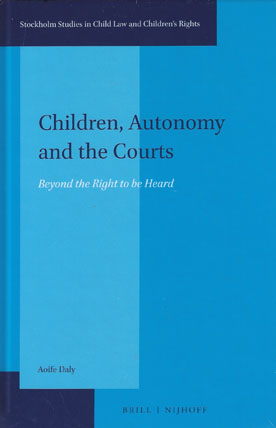We will be closed from 5pm Thursday 17th April for the Easter Bank Holidays, re-opening at 8.30am on Tuesday 22nd April. Any orders placed during this period will be processed when we re-open.

In this book Aoife Daly argues that where courts decide children’s best interests (for example about parental contact) the Convention on the Rights of the Child "right to be heard" is insufficient, and autonomy should instead be the focus.
Global law and practice indicate that children are regularly denied due process rights in their own best interest proceedings and find their wishes easily overridden. It is argued that a children’s autonomy principle, respecting children’s wishes unless significant harm would likely result, would ensure greater support for children in proceedings, and greater obligations on adults to engage in transparent decision-making.
This book is a powerful call for a reconceptualisation of the status of children in a key area of children’s rights.